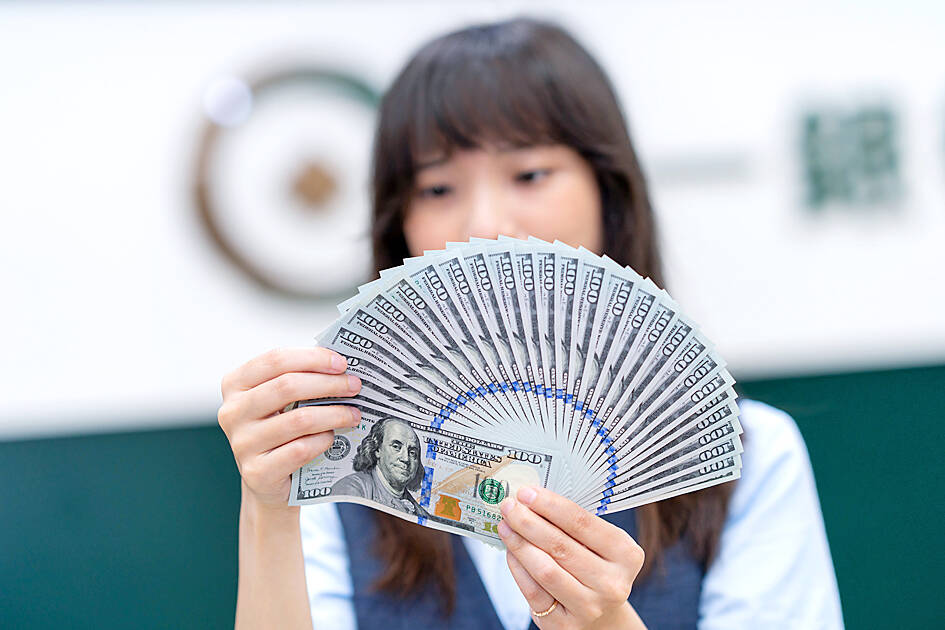Net fund outflows from foreign investors totaled US$5.45 billion last month, the third consecutive month of net foreign fund outflows and the highest after US$6.8 billion in March, Financial Supervisory Commission (FSC) data showed on Monday.
The latest figure brought cumulative fund outflows by foreign investors in the first eight months of this year to a record US$16.7 billion amid persistent sales of local shares, the data showed.
That compared with net fund inflows of US$7.45 billion by foreign investors during the same period last year, the commission said.

Photo: Chen Mei-ying, Taipei Times
Last month’s net fund outflows came as foreign investors sold a net NT$107 billion (US$3.48 billion) of local shares in the month following rate hikes by the US Federal Reserve.
From January to last month, foreign investors sold a net NT$1.01 trillion of local shares, comprising net sales of NT$961.6 billion on the Taiwan Stock Exchange and net sales of NT$44.4 billion on the Taipei Exchange, the data showed.
Amid a high-interest rate environment, foreign investors are pursuing high-yield assets and have adjusted their holdings of local shares, the commission told an online news conference.
Foreign funds would return to the local market, as Taiwanese equities have good fundamentals, Securities and Futures Bureau Deputy Director Kao Ching-ping (高晶萍) said.
The average daily turnover of local shares has fallen to about NT$200 billion, compared with an average of NT$390 billion last year, indicating that investors have become more conservative toward local shares due to rate hikes and geopolitical tensions, Kao said.
The commission would monitor the situation and implement measures to boost the turnover if necessary, she said.

UNCERTAINTY: Innolux activated a stringent supply chain management mechanism, as it did during the COVID-19 pandemic, to ensure optimal inventory levels for customers Flat-panel display makers AUO Corp (友達) and Innolux Corp (群創) yesterday said that about 12 to 20 percent of their display business is at risk of potential US tariffs and that they would relocate production or shipment destinations to mitigate the levies’ effects. US tariffs would have a direct impact of US$200 million on AUO’s revenue, company chairman Paul Peng (彭雙浪) told reporters on the sidelines of the Touch Taiwan trade show in Taipei yesterday. That would make up about 12 percent of the company’s overall revenue. To cope with the tariff uncertainty, AUO plans to allocate its production to manufacturing facilities in

TAKING STOCK: A Taiwanese cookware firm in Vietnam urged customers to assess inventory or place orders early so shipments can reach the US while tariffs are paused Taiwanese businesses in Vietnam are exploring alternatives after the White House imposed a 46 percent import duty on Vietnamese goods, following US President Donald Trump’s announcement of “reciprocal” tariffs on the US’ trading partners. Lo Shih-liang (羅世良), chairman of Brico Industry Co (裕茂工業), a Taiwanese company that manufactures cast iron cookware and stove components in Vietnam, said that more than 40 percent of his business was tied to the US market, describing the constant US policy shifts as an emotional roller coaster. “I work during the day and stay up all night watching the news. I’ve been following US news until 3am

Taiwan will prioritize the development of silicon photonics by taking advantage of its strength in the semiconductor industry to build another shield to protect the local economy, National Development Council (NDC) Minister Paul Liu (劉鏡清) said yesterday. Speaking at a meeting of the legislature’s Economics Committee, Liu said Taiwan already has the artificial intelligence (AI) industry as a shield, after the semiconductor industry, to safeguard the country, and is looking at new unique fields to build more economic shields. While Taiwan will further strengthen its existing shields, over the longer term, the country is determined to focus on such potential segments as

COLLABORATION: Given Taiwan’s key position in global supply chains, the US firm is discussing strategies with local partners and clients to deal with global uncertainties Advanced Micro Devices Inc (AMD) yesterday said it is meeting with local ecosystem partners, including Taiwan Semiconductor Manufacturing Co (TSMC, 台積電), to discuss strategies, including long-term manufacturing, to navigate uncertainties such as US tariffs, as Taiwan occupies an important position in global supply chains. AMD chief executive officer Lisa Su (蘇姿丰) told reporters that Taiwan is an important part of the chip designer’s ecosystem and she is discussing with partners and customers in Taiwan to forge strong collaborations on different areas during this critical period. AMD has just become the first artificial-intelligence (AI) server chip customer of TSMC to utilize its advanced